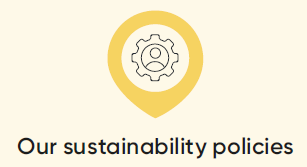Sustainable Finance

Stimulating sustainability through our main activities
We contribute to sustainable societies through financing, insuring, and investing. Our solutions address financial literacy, health and longevity, entrepreneurship, and environmental responsibility. We also enhance the sustainability of our own operations. Discover how we tackle these key ESG topics here.
Our approach to sustainable finance

We have strict sustainability policies for all business activities. These are bundled under our KBC Group Sustainability Policy Framework. This framework gives a comprehensive overview of our sustainability policies for our business operations and how they are applied across our various activities. The framework also includes more information on the due diligence process and remedial actions in place.

Sustainability is crucial in managing both our clients' and our own investments. We have a long history of responsible investing, with Responsible Investing (RI) funds being the preferred choice for our clients. Sustainability is also increasingly important for our own investments. Read our approach in our Sustainability Report.

We aim to increase our positive societal impact through our core activities: financing, insuring, and advising on projects that create positive societal change. This includes education, basic infrastructure, essential services, healthcare, and employment. Additionally, we support financial inclusion through microfinance and microinsurance via our unique partnership with BRS. Discover our commitment concerning our social impact.

Environmental responsibility is a key focus of our sustainability strategy. We aim to manage the direct and indirect impact of our company on the environment. Our approach is to adopt environmental actions, policies, and climate-related targets for parts of our loan, investment, and insurance portfolios.
At our company, we are committed to reducing our direct environmental impact of our own operations through a comprehensive approach.
- Measure: Since 2015, we have been calculating the GHG emissions from our own operations at the group level. They have been verified each year by an independent external party.
- Reduce: We set group-wide reduction targets in 2016 and tightened them over the years. Our goals include an 80% reduction in our own emissions by 2030 (compared to 2015) and sourcing 100% renewable electricity by 2030, which we achieved in 2021. We have implemented ISO 14001 and ISO 50001 environmental management systems, invested in energy-saving solutions, and supported greener employee mobility.
- Carbon offsetting: Since 2021, we have been offsetting our own GHG emissions that cannot yet be eliminated by investing in high-quality, certified projects.
Our largest environmental impact is indirect, through financing, insuring, and investing in other parties. We are working on our environmental impact within the framework of our Sustainable Finance Programme. The programme spans a range of themes such as climate change, biodiversity, circularity, pollution and water.
- We assess the environmental impact of most of our products and services. Since 2019, we have calculated the financed emissions associated with our lending portfolio. Also, we assessed the carbon intensity of our investment portfolios since 2020 and calculated emissions for part of our insurance underwriting portfolio since 2023.
- We set decarbonisation targets for sectors that make up the majority of our lending portfolio (in terms of associated financed Scope 1 and 2 emissions), KBC Asset Management's Responsible Investing funds, and KBC Insurance’s own investments. The latter includes the combined equity and corporate bond portfolio of KBC Insurance.
- We assessed for the first time in 2024 the indirect impact of our lending portfolio on nature.
More information on our indirect environmental impact and progress towards our targets can be found in our Sustainability Report.